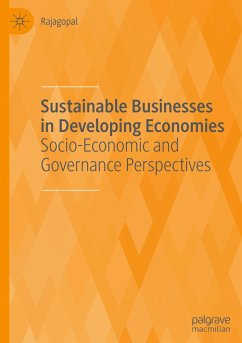Trends in cleaner business decisions have resulted in sustainable business models involving society, stakeholders, and consumers. Sustainable choices of companies create competitive differentiations that enable consumers to weigh social values and shift loyalties in the competitive marketplace. This book focuses on sustainability as the pivot of marketing and argues that commitment to sustainability in business not only equips companies to have greater social impact but also inspires an emotional response in consumers that aids companies in growing their image, brands, and socio-political reputations. Exploring topics such as the circular economy, sustainable logistics, eco-innovation, conscious consumption, and social entrepreneurship, the chapters discuss sustainable practices in emerging markets and co-creation between corporations and consumers. This book offers researchers innovative concepts on sustainable business modelling.
Bitte wählen Sie Ihr Anliegen aus.
Rechnungen
Retourenschein anfordern
Bestellstatus
Storno








